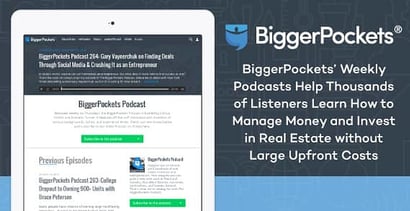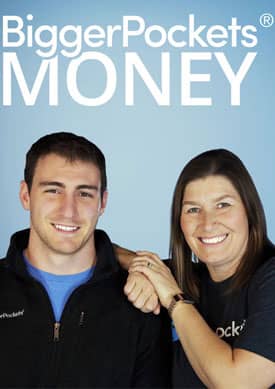

In a Nutshell: When Joshua Dorkin’s investment property began costing him more than it earned, he turned to the internet for advice on improving his prospects as a landlord. What he found were advertisements for weekend seminars that cost almost as much as he spent on the property he rented out. Determined to learn more about the subject and pass that advice along to other potential investors, he created BiggerPockets. Now, the site hosts an online forum and produces a wide array of educational resources, as well as the world’s most popular real estate investment podcast. And because having your finances on track is an important first step to investment, the website launched its BiggerPockets Money Podcast in 2018 to offer expert-guided advice on ways to save, budget, and grow wealth.
Back in 2004, Joshua Dorkin decided to use some of the money he’d saved and put it into real estate. He purchased a house thousands of miles away from his residence, hired a property manager, and waited for the checks to come rolling in.
He quickly learned that it’s hard to succeed in any field without proper education.
First, he didn’t know how to properly vet a property manager and ended up choosing one who, in turn, didn’t know how to effectively vet tenants. The result was missed rent payments and property damage that nearly sunk the investment before it began.
Online searches for information on property investing yielded few results. Self-proclaimed successful investors offered weekend workshops that cost thousands of dollars and crammed expensive knowledge into a few brief speeches.
Determined to better his situation, and that of countless others’, Dorkin created BiggerPockets, a website that offers free educational tools and lessons to help users achieve financial freedom. The website hosts a popular forum and is home to the most downloaded real estate investing podcast on the internet — the BiggerPockets Podcast.

In January 2018, the company introduced the BiggerPockets Money Podcast, which offers tips on how to grow wealth to help listeners in their financial journeys. For Mindy Jensen, Community Manager at BiggerPockets and co-host of the weekly Money Podcast, each episode is a labor of love.
“The difference between being financially healthy and financially sick is very little,” she said. “You just have to make small tweaks to make your life very different.”
Jensen also manages the BiggerPockets forums and said the top question she receives from users is how they can get into real estate investing with no upfront money and bad credit.
“The easy answer is you can’t unless you fix your no-money-and-bad-credit situation first,” she said. “Both podcasts, and really the whole website, are geared toward money and real estate investing. You can ask questions about problems with a landlord or a specific deal. It’s a great way to get started.”
Jensen’s own real estate investment experiences make her a key contributor to the website and podcasts, where she regularly educates listeners and readers on ways to get into real estate investing with minimal upfront costs.
Money Podcast Introduces Ways to Save and Budget
Each week, Jensen and co-host Scott Trench interview unique and powerful thought leaders about how to earn more, keep more, spend smarter, and grow wealth. After one month of recording, the podcast is already averaging around 25,000 downloads a week for previous episodes.
Past episodes include interviews with experts on creative ways to save money by making more cost-effective meals, as well as budgeting and shopping in ways that create excess cash flow that can be used to eliminate debt and save toward investment opportunities.

Scott Trench and Mindy Jensen host the BiggerPockets Money Podcast.
Jensen, whose finance background lends to her blogging expertise, said she enjoys helping listeners discover new ways to audit their spending.
“The absolute, number one thing you can do is track your spending when you’re first starting out,” she said. “You can’t know where to cut your expenses if you don’t know where all of your money is going.”
She said the first time she tracked her spending, she realized how much her daily trips to the grocery store cost her.
“I’d stop in to get one thing, but one thing always turns into five things,” she said. “That adds up really quickly if you’re doing it every day. I didn’t realize it because I just saw it as a part of my everyday errands.”
Jensen said that consistently tracking expenses can lead to other eye-opening experiences that can cut costs over the long run.
“Once you’ve tracked it for a month or two, you can really examine what you’re spending on,” she said. “If you are the type of person who goes out to dinner five times a week because you don’t have enough time each evening to cook, you can make time over the weekend to cook for the week ahead. Freezer meals can save a lot of money each week on your grocery bill.”
Jensen and Trench’s tips are entertaining and insightful and have led listeners to breakthroughs in their own financial journey.
“I hope to show people that dealing with money isn’t hard, but you need to make smart decisions,” she said. “Small tweaks in your life now can reveal huge results down the road.”
Jensen and Trench also maintain the website’s real estate theme by providing insights into their own methods of investing, which they call House Hacks.
BiggerPockets Real Estate Podcast Helps Listeners Find House Hacks
Since 2013, Dorkin and co-host Brandon Turner have interviewed real estate investing expert, and provided education from their own experiences on the BiggerPockets Podcast.

Joshua Dorkin and Brandon Turner host the BiggerPockets Podcast.
Jensen, who is a contributor to the show, has her own real estate investing method that she calls “Live-in Flipping” that has paid off over the last decade.
“I move into a property that is habitable, but extremely ugly,” she said. “Over two years I rip the place apart and put it back together.”
She said maintaining the residence for two years is important to the IRS. After owning and living in a property for at least two years, the 15-20% capital gains taxes are eliminated — up to $250,000 if you’re single or $500,000 if you’re married —when the house sells.
Jensen said she currently owns a house for which she paid $176,000. After putting approximately $100,000 of work into it, the house is now worth $550,000.
“If I were to sell it today, I’d take the $176,000 I paid for it and the $100,000 I put into it to make $276,000,” she said. “I could sell it for $550,000 and take the $274,000 left over and, since I’m married, put it right in my pocket and pay zero capital gains taxes on it.”
Without the exception, the gains taxes on that sale would equal $41,100. According to her bio on BiggerPockets, Jensen has used this method multiple times in the last 10 years to great success.
“The trick is you don’t have to buy a house that’s so horrible that you have to fix everything,” she said. “You can buy a house that has ugly carpeting or ugly paint or horrible wallpaper. When you move in, you don’t have to destroy the inside of the house all at once. You can pick and choose your rehab projects because you have at least two years in the house.”
Jensen’s experience happened more by circumstance than design. When she was ready to buy her first house, she had a choice of either an ugly home or remaining with her parents. She purchased the home and two years later sold it for double what she paid.
Free Educational Resources from a Network of Experts
Thousands of people turn to BiggerPockets every month for the podcast and the financial education content that is free of charge. Over the last decade, the company has increased in size to become the internet leader in real estate investing advice for consumers with almost any amount of money to invest.
“Real estate investing isn’t really hard,” Jensen said. “We give you all of the information you need to have your investment make money, to do it right, and to operate within the law.”
The website’s latest addition, the Money Podcast, taps into a vast network of experts to discover new and insightful ways of saving, budgeting and growing wealth. The goal is to show listeners that small lifestyle changes can lead to big gains — without completely revamping your habits.
“Eating out every single night isn’t the smartest choice,” Jensen said. “That doesn’t mean you can never eat out. If you plan ahead, you can eat in through the weekdays and go out with your friends over the weekend and not spend as much.”
Jensen and her coworkers see the advice they give as a free service to a community of listeners who want to improve their savings, but need help learning the things not taught in school.
“In my real life, I don’t use a lot of the stuff I learned in school,” she said. “I’ve never had to use the Pythagorean Theorem, but I sure have needed to know about mortgage insurance and how to balance a checkbook. I didn’t learn those things in school and had to learn about them out of school.”
Advertiser Disclosure
BadCredit.org is a free online resource that offers valuable content and comparison services to users. To keep this resource 100% free for users, we receive advertising compensation from the financial products listed on this page. Along with key review factors, this compensation may impact how and where products appear on the page (including, for example, the order in which they appear). BadCredit.org does not include listings for all financial products.
Our Editorial Review Policy
Our site is committed to publishing independent, accurate content guided by strict editorial guidelines. Before articles and reviews are published on our site, they undergo a thorough review process performed by a team of independent editors and subject-matter experts to ensure the content’s accuracy, timeliness, and impartiality. Our editorial team is separate and independent of our site’s advertisers, and the opinions they express on our site are their own. To read more about our team members and their editorial backgrounds, please visit our site’s About page.
